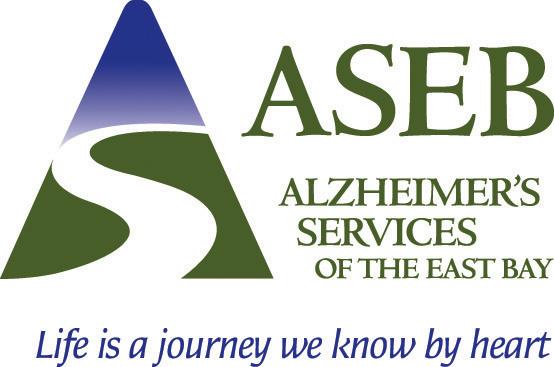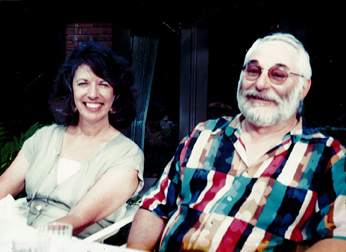The following letter comes courtesy of caregiver Michaele O’Leary-Reiff, whose husband Allen is a participant at ASEB’s Berkeley Adult Day Health Care Program.
“Hello, I must be going…” read the note addressed to me and taped to the door of office #912 of the Philosophy/Humanities Department at our local community college. It was the office of Allan Reiff, a professor of Philosophy and Humanities, a man with whom I was about to fall deeply in love. The year was 1983, and little did I know, then, the dark truth hidden in those seemingly light-hearted words, that the man I would eventually marry would be taken from me all too soon by the ravages of Alzheimer’s Disease.
We had met the year before in 1982. I had been a practicing lay midwife for 10 years and had recently gone back to school to get my license as a Registered Nurse, completing the prerequisite science courses needed to get into the college’s Nursing Program. I also needed a few elective non-nursing units so enrolled in Allan’s Philosophy class, which had been highly recommended. On the first day of class, I was riveted to his words, when he said he believed the world would be a more peaceful and equitable place if governments were run by Romanian gypsies and ballet dancers rather than by politicians and dictators. I never stopped listening for what he would say next. He was my teacher who over time would become my best friend, lover, soulmate and eventually my beloved spouse.
Our friendship developed quickly. Soon we were talking after class, meeting for coffee and having long intellectual discussions and conversations about movies, books, politics, philosophy, our children and the meaning of life. I knew immediately he was brilliant, but besides his obvious intellectual prowess, he was sweet, charming, unassuming, handsome, an amazing listener and easy to be with. Over the next couple of years, as we got to know each other more deeply, we became much more than friends.
We were in love! Ours was a mid-life relationship, both of us having been previously married. Allan was just turning 50 and I 40. Between us we had six children, his two and my four. It was an exciting time for us. We were independent, mature adults with professional stability, entering a stage in our lives where we could do the things we loved together, enjoying music, movies, theater, travel, family holidays and mostly each other’s company, creating beautiful memories.
In 1988, we decided to live together, bought our home in 1990 and married in 1994. We planned for many years of financial stability and looked forward to more travel, eventual retirement, being surrounded by grandchildren and growing old together. Allan loved teaching and thought he would teach well into old age if he could. In high school, he was not a good student and fancied himself as a “hipster.” He loved drag racing and souped up cars and wanted to be an auto mechanic.
At age 18, he dropped out of high school and joined the Air Force, and when discharged four years later, he became a mechanic with United Airlines in San Francisco. Enamored with the City and its night life, he spent a lot of time in the clubs and developed a keen interest in contemporary jazz. He enrolled in City College to study broadcasting, where he met a wonderful teacher who told him he didn’t have the voice or diction for broadcasting but encouraged him to transfer to San Francisco State, get a full degree and go to graduate school. There he majored in Philosophy and Humanities, became a lover of paintings and museums and a life-long learner.
After grad school, for the next 35 years, he spent his career teaching Philosophy at Chabot Community College in Hayward. It was because of being mentored by a caring teacher in community college that Allan became a teacher himself and chose to work with students with backgrounds similar to his. He devoted himself to working in an environment where he could help students who otherwise might not be motivated to go onto higher education, encouraging them to believe in themselves and to recognize their own potential. He instilled in his students a love for learning, mentoring them to become critical thinkers and opening their minds to new and creative ideas. His efforts were rewarded by seeing many of his students go on to study at U. C. Berkeley and other universities and state colleges.
In 2003, at the age of 70, Allan decided to take his retirement, with the intention of continuing to teach part-time. A few months before, I had begun to notice some concerning memory problems. He would occasionally get lost while driving to familiar places or forget where he was going and have to call home to get directions. Right before finals week of the Spring semester, we went away for a three day weekend, and the afternoon we returned home, there were numerous phone messages from his department secretary and many students that he had not shown up for a scheduled final exam that morning. He had completely forgotten the scheduled exam.
Later in the Fall, we went on a long-planned trip to Europe to celebrate Allan’s retirement, traveling through France, Spain and Italy. Being in different countries with unfamiliar languages and cultures, he became increasingly forgetful and confused, unable to find his way around. He had trouble ordering food, navigating the trains and subways and even packing his suitcase. The times we rented a car, I had to do all the driving and mapping our course.
Upon returning home, he began to have panic attacks while driving on the freeway, was getting lost more frequently and forgetting how to do even simple household tasks. Our daily lives became gradually more and more stressful, and I could no longer deny that my brilliant husband had a serious problem with his cognitive function.
In November, 2004, we saw a neurologist at California Pacific Medical Center, where after giving a lengthy history and being subjected to a battery of laboratory, radiology, imaging and cognitive function tests, Allan was given a diagnosis of early stage vascular dementia. Even though our experiences had prepared us for the worst, he was devastated by the diagnosis and terrified of losing his mind, his most treasured asset.
We spent the next year in a state of shock, trying to make sense of it all, exploring ways we might stop this derailing runaway train we were on. At first Allan, being the intellect he is, spent all his time reading everything he could find on dementia and Alzheimer’s Disease. He read books on boosting brain power, detoxifying his body and read over and over, Final Exit, a book on how to take your own life. He begged me to promise him that I would help him end his life before he lost his mind completely and ended up in a nursing home. He easily became angry and would go into a rage over the slightest upset.
It seemed our lives were spinning out of control. Nevertheless, over the next couple of years, we learned a new way of “normal,” coping the best we could and trying to find a productive life under our life situation. We took care of business, planning for the future, saw an elderlaw attorney, made a family trust, talked to our children and tried to carry on. Allan continued to teach part-time for three years after retiring but finally had to stop as it became more and more apparent that he was not able to maintain continuity in covering the class syllabus and mentoring his students.
During this time he also had to stop driving, a deep loss for him. In 2007, I was deeply stressed and anxious, was not sleeping well and knew I could not continue to do this alone. I was feeling overwhelmed and trapped in the uncertainty of every day, let alone the months and years to come.
I had heard about Alzheimer’s Services of the East Bay (ASEB) through Family Caregivers’ Alliance and was told about their early stage support group for people with dementia and their caregivers. With much effort, I convinced Allan to attend the group on a trial basis. This was the beginning of a newfound resource of support and caring from a group of people dedicated to helping those with dementia, their caregivers and their families.
After a couple of years of attending the support group, Allan needed more supervision, and I needed more help, so he began attending the adult day care center at ASEB a couple days a week. He grew to love the staff and the student volunteers who talked to him. He now attends the day center almost every day, giving me the respite time I need to manage our household and all the obligations I have in addition to caregiving.
As we continue this journey together, my husband, as he progresses to the later stages of Alzheimer’s Disease, continues to be my teacher. With each new challenge, he shows me how one can adapt to and accept with grace what life brings. It is with the ongoing support of ASEB that he stays engaged in life, albeit in a much narrower parameter and that I continue to survive as a caregiver and maintain a semblance of my own life’s work and goals.
The staff at ASEB provides a loving and safe environment, respects and honors the dignity, individuality and life history of each client, provides an enriching program of activities, entertainment, laughter and fun, and manages to always be there for the caregivers and families. I always know I can call and talk to someone if I’m having a hard time, get accurate information about resources, be assured of a hug or just sit and cry when my heart overflows with sadness and grief.
Please give generously to this much-needed program. ASEB provides a unique and comprehensive model of care, where people with dementia can receive the specialized attention they need while making it possible for them to continue to live at home surrounded by their loved ones.
Many folks who need it most would not be able to attend without the donations of individuals and groups like you. Whatever monetary support you can give, you will know you are contributing greatly to the quality of life of those who depend on the compassion and love of others. Think of your donation as part of the wellspring that brings a bit of joy and vitality to those suffering from dementia, a spark of hope to each day they have left to live.
Thank you for your support.
Michaele O’Leary-Reiff

